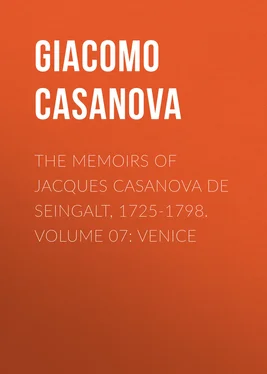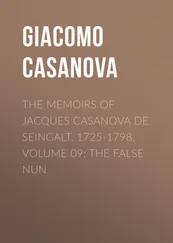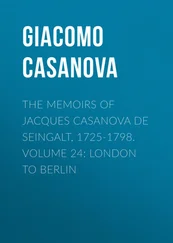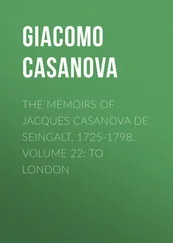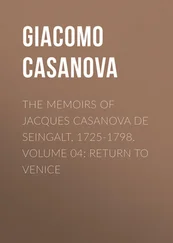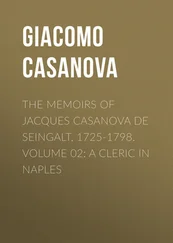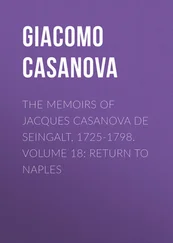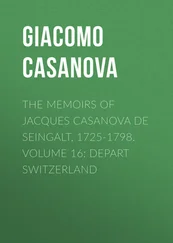Giacomo Casanova - The Memoirs of Jacques Casanova de Seingalt, 1725-1798. Volume 07 - Venice
Здесь есть возможность читать онлайн «Giacomo Casanova - The Memoirs of Jacques Casanova de Seingalt, 1725-1798. Volume 07 - Venice» — ознакомительный отрывок электронной книги совершенно бесплатно, а после прочтения отрывка купить полную версию. В некоторых случаях можно слушать аудио, скачать через торрент в формате fb2 и присутствует краткое содержание. Жанр: Биографии и Мемуары, История, foreign_edu, foreign_antique, foreign_prose, на английском языке. Описание произведения, (предисловие) а так же отзывы посетителей доступны на портале библиотеки ЛибКат.
- Название:The Memoirs of Jacques Casanova de Seingalt, 1725-1798. Volume 07: Venice
- Автор:
- Жанр:
- Год:неизвестен
- ISBN:нет данных
- Рейтинг книги:5 / 5. Голосов: 1
-
Избранное:Добавить в избранное
- Отзывы:
-
Ваша оценка:
- 100
- 1
- 2
- 3
- 4
- 5
The Memoirs of Jacques Casanova de Seingalt, 1725-1798. Volume 07: Venice: краткое содержание, описание и аннотация
Предлагаем к чтению аннотацию, описание, краткое содержание или предисловие (зависит от того, что написал сам автор книги «The Memoirs of Jacques Casanova de Seingalt, 1725-1798. Volume 07: Venice»). Если вы не нашли необходимую информацию о книге — напишите в комментариях, мы постараемся отыскать её.
The Memoirs of Jacques Casanova de Seingalt, 1725-1798. Volume 07: Venice — читать онлайн ознакомительный отрывок
Ниже представлен текст книги, разбитый по страницам. Система сохранения места последней прочитанной страницы, позволяет с удобством читать онлайн бесплатно книгу «The Memoirs of Jacques Casanova de Seingalt, 1725-1798. Volume 07: Venice», без необходимости каждый раз заново искать на чём Вы остановились. Поставьте закладку, и сможете в любой момент перейти на страницу, на которой закончили чтение.
Интервал:
Закладка:
"Sir, I am starving."
"Eh! what are you complaining of?" answered Maisonrouge, sighing deeply;"I wish I was in your place, you rogue!"
At that time I made the acquaintance of a Milanese dancer, who had wit, excellent manners, a literary education, and what is more—great beauty. She received very good society, and did the honours of her drawing-room marvellously well. I became acquainted at her house with Count Christopher Erdodi, an amiable, wealthy and generous man; and with a certain Prince Kinski who had all the grace of a harlequin. That girl inspired me with love, but it was in vain, for she was herself enamoured of a dancer from Florence, called Argiolini. I courted her, but she only laughed at me, for an actress, if in love with someone, is a fortress which cannot be taken, unless you build a bridge of gold, and I was not rich. Yet I did not despair, and kept on burning my incense at her feet. She liked my society because she used to shew me the letters she wrote, and I was very careful to admire her style. She had her own portrait in miniature, which was an excellent likeness. The day before my departure, vexed at having lost my time and my amorous compliments, I made up my mind to steal that portrait—a slight compensation for not having won the original. As I was taking leave of her, I saw the portrait within my reach, seized it, and left Vienna for Presburg, where Baron Vais had invited me to accompany him and several lovely frauleins on a party of pleasure.
When we got out of the carriages, the first person I tumbled upon was the Chevalier de Talvis, the protector of Madame Conde-Labre, whom I had treated so well in Paris. The moment he saw me, he came up and told me that I owed him his revenge.
"I promise to give it to you, but I never leave one pleasure for another," I answered; "we shall see one another again."
"That is enough. Will you do me the honour to introduce me to these ladies?"
"Very willingly, but not in the street."
We went inside of the hotel and he followed us. Thinking that the man, who after all was as brave as a French chevalier, might amuse us, I presented him to my friends. He had been staying at the same hotel for a couple of days, and he was in mourning. He asked us if we intended to go to the prince-bishop's ball; it was the first news we had of it. Vais answered affirmatively.
"One can attend it," said Talvis, "without being presented, and that is why we intend to go, for I am not known to anybody here."
He left us, and the landlord, having come in to receive our orders, gave us some particulars respecting the ball. Our lovely frauleins expressing a wish to attend it, we made up our minds to gratify them.
We were not known to anyone, and were rambling through the apartments, when we arrived before a large table at which the prince-bishop was holding a faro bank. The pile of gold that the noble prelate had before him could not have been less than thirteen or fourteen thousand florins. The Chevalier de Talvis was standing between two ladies to whom he was whispering sweet words, while the prelate was shuffling the cards.
The prince, looking at the chevalier, took it into his head to ask him, in a most engaging manner to risk a card.
"Willingly, my lord," said Talvis; "the whole of the bank upon this card."
"Very well," answered the prelate, to shew that he was not afraid.
He dealt, Talvis won, and my lucky Frenchman, with the greatest coolness, filled his pockets with the prince's gold. The bishop, astonished, and seeing but rather late how foolish he had been, said to the chevalier,
"Sir, if you had lost, how would you have managed to pay me?"
"My lord, that is my business."
"You are more lucky than wise."
"Most likely, my lord; but that is my business."
Seeing that the chevalier was on the point of leaving, I followed him, and at the bottom of the stairs, after congratulating him, I asked him to lend me a hundred sovereigns. He gave them to me at once, assuring me that he was delighted to have it in his power to oblige me.
"I will give you my bill."
"Nothing of the sort."
I put the gold into my pocket, caring very little for the crowd of masked persons whom curiosity had brought around the lucky winner, and who had witnessed the transaction. Talvis went away, and I returned to the ball-room.
Roquendorf and Sarotin, who were amongst the guests, having heard that the chevalier had handed me some gold, asked me who he was. I gave them an answer half true and half false, and I told them that the gold I had just received was the payment of a sum I had lent him in Paris. Of course they could not help believing me, or at least pretending to do so.
When we returned to the inn, the landlord informed us that the chevalier had left the city on horseback, as fast as he could gallop, and that a small traveling-bag was all his luggage. We sat down to supper, and in order to make our meal more cheerful, I told Vais and our charming frauleins the manner in which I had known Talvis, and how I had contrived to have my share of what he had won.
On our arrival in Vienna, the adventure was already known; people admired the Frenchman and laughed at the bishop. I was not spared by public rumour, but I took no notice of it, for I did not think it necessary to defend myself. No one knew the Chevalier de Talvis, and the French ambassador was not even acquainted with his name. I do not know whether he was ever heard of again.
I left Vienna in a post-chaise, after I had said farewell to my friends, ladies and gentlemen, and on the fourth day I slept in Trieste. The next day I sailed for Venice, which I reached in the afternoon, two days before Ascension Day. After an absence of three years I had the happiness of embracing my beloved protector, M. de Bragadin, and his two inseparable friends, who were delighted to see me in good health and well equipped.
CHAPTER XI
I Return the Portrait I Had Stolen in Vienna I Proceed to Padua; An Adventure on My Way Back, and Its Consequences—I Meet Therese Imer Again—My Acquaintance With Mademoiselle C. C.
I found myself again in my native country with that feeling of delight which is experienced by all true-hearted men, when they see again the place in which they have received the first lasting impressions. I had acquired some experience; I knew the laws of honour and politeness; in one word, I felt myself superior to most of my equals, and I longed to resume my old habits and pursuits; but I intended to adopt a more regular and more reserved line of conduct.
I saw with great pleasure, as I entered my study, the perfect 'statu quo' which had been preserved there. My papers, covered with a thick layer of dust, testified well enough that no strange hand had ever meddled with them.
Two days after my arrival, as I was getting ready to accompany the Bucentoro, on which the Doge was going, as usual, to wed the Adriatic, the widow of so many husbands, and yet as young as on the first day of her creation, a gondolier brought me a letter. It was from M. Giovanni Grimani, a young nobleman, who, well aware that he had no right to command me, begged me in the most polite manner to call at his house to receive a letter which had been entrusted to him for delivery in my own hands. I went to him immediately, and after the usual compliments he handed me a letter with a flying seal, which he had received the day before.
Here are the contents:
"Sir, having made a useless search for my portrait after you left, and not being in the habit of receiving thieves in my apartment, I feel satisfied that it must be in your possession. I request you to deliver it to the person who will hand you this letter.
"FOGLIAZZI."
Happening to have the portrait with me, I took it out of my pocket, and gave it at once to M. Grimani, who received it with a mixture of satisfaction and surprise for he had evidently thought that the commission entrusted to him would be more difficult to fulfil, and he remarked,
Читать дальшеИнтервал:
Закладка:
Похожие книги на «The Memoirs of Jacques Casanova de Seingalt, 1725-1798. Volume 07: Venice»
Представляем Вашему вниманию похожие книги на «The Memoirs of Jacques Casanova de Seingalt, 1725-1798. Volume 07: Venice» списком для выбора. Мы отобрали схожую по названию и смыслу литературу в надежде предоставить читателям больше вариантов отыскать новые, интересные, ещё непрочитанные произведения.
Обсуждение, отзывы о книге «The Memoirs of Jacques Casanova de Seingalt, 1725-1798. Volume 07: Venice» и просто собственные мнения читателей. Оставьте ваши комментарии, напишите, что Вы думаете о произведении, его смысле или главных героях. Укажите что конкретно понравилось, а что нет, и почему Вы так считаете.
